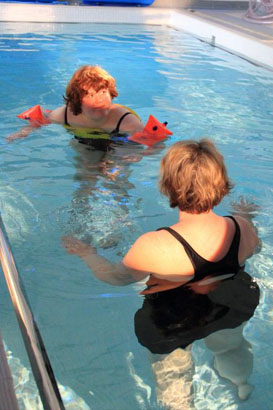Encouraging children to be independent is about pushing them to edge of their ability and moving them on from there. Teaching
children the skills they need to be independent can take up a significant part of the curriculum but it should start as early
as possible.
Vygotsky's 'zone of proximal development' can be simply described as the distance between the actual developmental level as determined by independent problem solving and the level of potential development as determined through problem solving under adult guidance, or in collaboration with more capable peers (Vygotsky, 1978).
The adult lays down supports for the child. These are known as 'ladders' and 'scaffolds', which are gradually taken away as the child learns to be more independent and solve problems on their own. Unfortunately, the difficulty with those with both severe and profound learning difficulties is that we often forget to take these props away.

Sometimes this is about the need to control and protect the child. For example, an adult may want to stop a child making a mess, which then has to be cleared up. Or an adult may not want a child to fail, because we believe that the child is unable to do things on their own. We believe it's 'easier' if we do it ourselves.
Even if we can overcome this tendency and all good teachers of children with SLD should strive to do this, one of the key reasons for learned helplessness continuing is time.

Teachers, managers of teachers, and inspectors can become obsessed with time, and there's a tendency to cram all the elements
of a prescribed curriculum into a weekly schedule
or timetable.
The adoption of a subject-based, curriculum model has resulted in a tendency towards teaching facts rather than the ability to think and act independently. We have become a short-term, results-driven industry. As a consequence, we may find ourselves rushing to finish English or Maths or History, so that Geography or Science can have its allotted time.
There are clear implications here for children with SLD, for whom deep learning can take a considerable amount of time.
As most learning will be through the intervention and help of adults, it's important we recognise the difficulties which children with PMLD are likely to face and try to overcome them.
This is important when considering the tendency of adults to 'teach' those with learning difficulties to be helpless. A term originally devised by Martin Seligman (Seligman, 1975), learned helplessness should not be looked at as merely a benign result of adults doing things for children which they might be able to do themselves.
Seligman regarded the phenomenon as pernicious, in that those convinced of their inability to do things for themselves are likely to become over-dependent on their 'controllers' and unable to express any initiative, even when it's within their abilities to do so.
This can, and according to Seligman often does, lead to the development of general ennui and even deep-rooted depression. We might also question whether learned helplessness is a major contributory factor to the high prevalence of mental health problems among those with CLDD.
Watch the video clip below which features teachers Anthony Munday and Dean Cooke and some of the students they teach.
A major difficulty faced by those with learning
difficulties is the state of learned helplessness.
What do you think this is and how do you think
this comes about?
Vygotsky identifies three levels of child activity.
These are:
- Participatory
The child performs activities with considerable
physical assistance. - Supported
The child performs activities with guidance and support.
- Independent
The final level where the child should be expected to perform activities on their own.

Piaget, J. (1952) The Origins of Intelligence in Children, New York: International Press.
Vygotsky, L.S. (1978), Cole, M. et al.(ed) Mind in Society: the Development of Higher Psychological Processes, Harvard University Press.
Barber, M. (1994) Contingency Awareness: Putting Research into the Classroom in Coupe O'Kane, J. and Smith, B. (eds) Taking Control, London: David Fulton.
Collis, M. and Lacey, P. (1996) Interactive Approaches to Teaching, London: David Fulton.
Hewett, D. and Nind, M. (1998) Interaction in Action, London: David Fulton.

Imray, P. (2008) Turning the Tables on Challenging Behaviour, London: Routledge.
Seligman, M. (1975) Helplessness: On Depression, Development and Death, San Francisco CA: WH Freeman.
Smith, B. (1994) Handing over control to people with learning difficulties in Coupe-O'Kane, J. and Smith, B. (eds), Taking Control: Enabling People with Learning Difficulties, London: David Fulton.
Ware, J. (2003) Creating a Responsive Environment for People with Profound and Multiple Learning Difficulties, London: David Fulton.
Wilkinson, C. (1994) 'Teaching Pupils with Profound and Multiple Learning Difficulties to Exert Control' in Coupe O'Kane, J. and Smith, B. (eds) Taking Control: Enabling People with Learning Difficulties, London: David Fulton.
